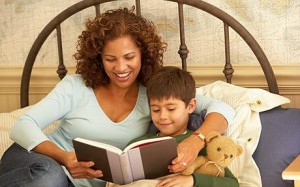 One of my earliest memories as a child was sitting on a wooden porch swing reading books with my mom. My mom tells me that she started reading to me from day one, and even read to her belly while she was pregnant. Needless to say, books have always held an important place in our home.
One of my earliest memories as a child was sitting on a wooden porch swing reading books with my mom. My mom tells me that she started reading to me from day one, and even read to her belly while she was pregnant. Needless to say, books have always held an important place in our home.
When my son Aaron was born, my husband and I started reading to him right away too. In the beginning we had some children’s books, but we would also read aloud whatever each of us happened to be reading at the time. Aaron heard a little Harry Potter and some Bicycling magazine, and even a few academic studies that I had to read for work. Now that he’s two years old, we read at least three or four children’s books together each day. Currently, his favorite stall tactic is, “Mama, how about we read a book?”
A few weeks ago, when a friend passed along a book to me about the benefits of reading to children, I was eager to learn about the tangible benefits. The book, called Reading Magic, makes the case that reading aloud to children helps them develop an interest in books, encourages those first words, inspires them to learn to read themselves, and creates a special bond between child and parent.
While I found the book interesting, it doesn’t offer any systematic, concrete evidence about reading aloud to children. So, of course, I had to do some digging. It turns out my mom knew what she was doing all those years ago!
Three separate systematic reviews of what educators call dialogic reading – essentially engaging in a conversation with young children as you read to them – found positive effects for language skills, improved literacy and school readiness.
The study that piqued by interest the most was a review of 10 studies published by the Puckett Institute’s Research and Training Center on Early Childhood Development, an organization dedicated to identifying and implementing evidence-based practices that improve the development of at-risk infants, toddlers, and preschoolers.
The study identified several specific benefits for children who regularly participated in dialogic reading, including: positive gains in expressive language development, increases in the length of spoken phrases, and greater expressive vocabulary scores.
All of this raises the question, what the heck makes dialogic reading so special? Essentially, the adult helps the child become the teller of the story by asking questions and prompting the child to participate. The Reading Rockets project, sponsored by the U.S. Department of Education, provides some practical tips on how to engage in dialogic reading with kids.
If there are any small children in your life, sit down with them for a regular story time. The evidence shows it’s great for kids.



I know that it makes a world of difference to read to an unborn child as well as a living child. I read to my baby before she was born and as well as after she came into the world. When she became 6 weeks old, my daughter’s father and I purchase the system known at the time “Babies Can Read”. We read the entire parent guide and immediately started using the system. It worked for our daughter. By the time our daughter started daycare at 3 years old, she was able to sit down and read a simple child’s book. Then before she entered pre-K, the daycare director tested her, and she was able to recite and recognize all of the words for the state as well as the words for kindergarten before turning 4 years old. I know that there was an enormous amount of controversy about this system later, in regards that it only taught children to memorize, but my experience with my daughter was totally different. Now that she is older, her “growing up” pains are in full effect and I am struggling to make her read more often than she did when she was younger. However, when she does read, she reads passionately. I still feel that myself and my daughter’s father made a profound choice when we decided to read to her constantly. I think it made a huge difference!
Thank you for this article, it was just what I was looking for to share with the parents of students about reading to and with their young children.